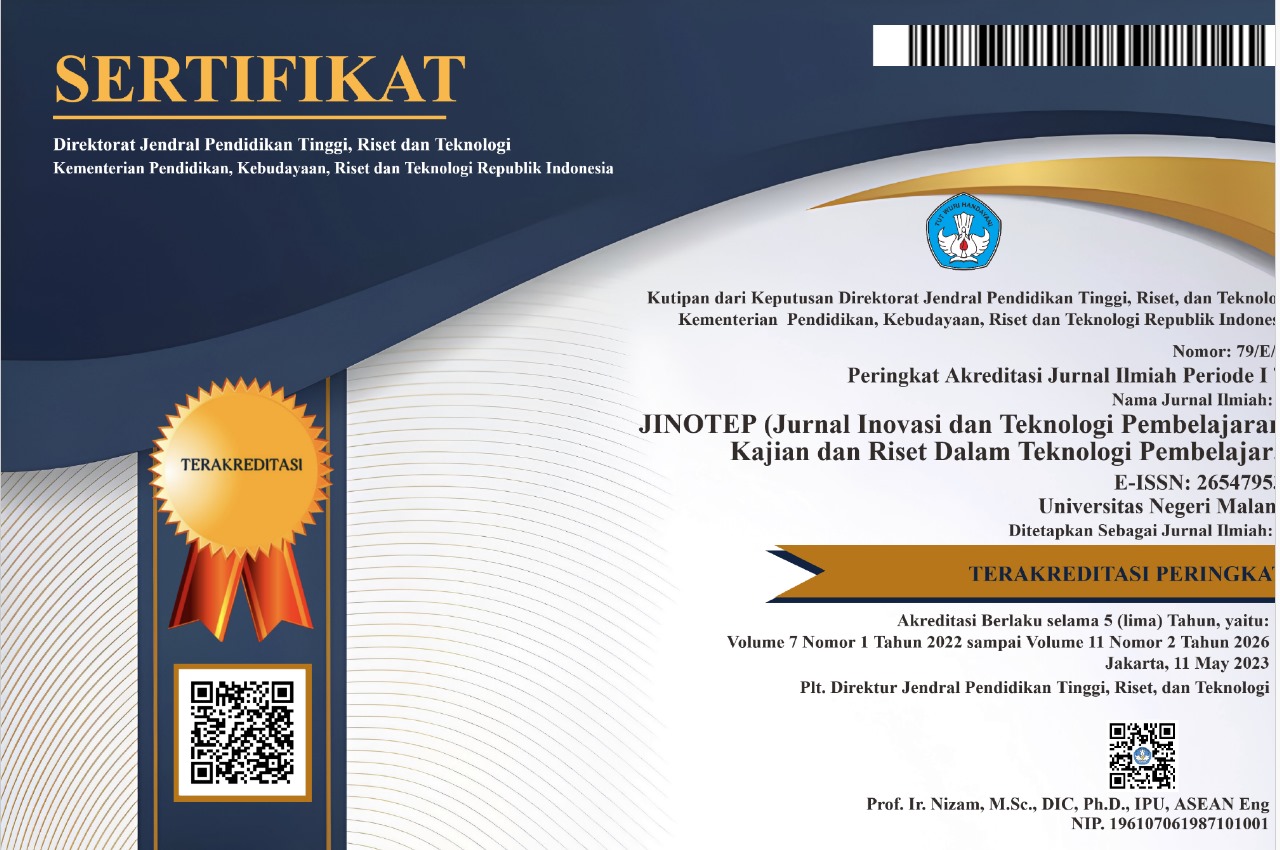Why should e-mentoring be preferred over traditional mentoring in teacher professional development: a systematic review
Abstract
Abstract: The improvement in teachers' professional competence is one of the key components to be continuously pursued to enhance the quality of education. E-mentoring has surfaced as a superior option, in contrast to conventional mentoring, by providing accessibility and adaptability. This research aims to analyse and evaluate e-mentoring and traditional mentoring for teachers' professional development, focusing on why e-mentoring might be preferred over traditional mentoring to support teachers' professional competence. The research method employs a systematic literature review of 15 articles accessed from 2020-2024. The results indicate that e-mentoring offers more accessibility and flexibility, while traditional mentoring excels in building strong interpersonal relationships. Factors influencing effectiveness include the quality of the mentor-mentee relationship, the use of technology, and the program design. Although e-mentoring shows great potential, particularly in overcoming geographical barriers, its effectiveness depends on careful implementation and adequate technological support
Keywords
Full Text:
PDFReferences
Alemdag, E., & Erdem, M. (2017). Designing an e-mentoring program for novice teachers in Turkey and investigating online interactions and program outcomes. Mentoring & Tutoring: Partnership in Learning, 25(2), 123–150. https://doi.org/10.1080/13611267.2017.1327394
Alexander, D., & Bloom, G. A. (2023). Exploring coaches’ experiences and perceptions of a virtual parasport coach mentorship program. Psychology of Sport and Exercise, 64, 102303. https://doi.org/10.1016/j.psychsport.2022.102303
Andarini, P., & Mulyono, R. (2022). Peningkatan kompetensi guru dalam penyusunan rpp dengan menerapkan model-model pembelajaran melalui teknik coaching. Didaktik : Jurnal Ilmiah PGSD STKIP Subang, 8(2), 1436–1447. https://doi.org/10.36989/didaktik.v8i2.457
Asif, M., Thomas, G., Awan, M. U., & Muhammad Din, A. (2021). Enhancing student engagement through heterogeneous pedagogical approaches: Action research in a university level course in Saudi Arabia. International Journal of Educational Management, 35(1), 1–28. https://doi.org/10.1108/IJEM-10-2019-0375
Borden, S. B., Maerz, B. J., & Bacon, D. R. (2020). The rock of gibraltar: The value of mentorship in the early years (Dr. Virginia Apgar and Dr. Ralph Waters). Journal of Anesthesia History, 6(2), 49–53. https://doi.org/10.1016/j.janh.2019.08.005
Brumovska, T. J. (2024). Characteristics of identified natural mentors in the experiences and perceptions of early-and-middle-aged adolescent youth: Implications for formal youth mentoring practice. Children and Youth Services Review, 163, 107765. https://doi.org/10.1016/j.childyouth.2024.107765
Carvalho, A. R., & Santos, C. (2022). Developing peer mentors’ collaborative and metacognitive skills with a technology-enhanced peer learning program. Computers and Education Open, 3, 100070. https://doi.org/10.1016/j.caeo.2021.100070
Cooper, D.R. and Schindler, P.S. (2001) Business Research Methods. McGraw-Hill Higher Education.
Daniel, C. (2014). Comparing online and face-to-face professional development. Unpublished. https://doi.org/10.13140/2.1.3157.5042
Darling-Hammond, L., Hyler, M., & Gardner, M. (2017). Effective teacher professional development. Learning policy institute. Retrieved from Learning Policy Institute website: https://learningpolicyinstitute.org/product/effective-teacher-professional-development-report
Erdoğan, S., Haktanır, G., Kuru, N., Parpucu, N., & Tüylü, D. K. (2022). The effect of the e-mentoring-based education program on professional development of preschool teachers. Education and Information Technologies, 27(1), 1023–1053. https://doi.org/10.1007/s10639-021-10623-y
Güler, M., & Çelik, D. (2022). Supporting novice mathematics teachers: The impact of e-mentoring on lesson analysis skills. Teaching and Teacher Education, 113, 103658. https://doi.org/10.1016/j.tate.2022.103658
Indriawati, P., Susilo, G., Saputra, D. S., & Seli, S. (2023). Gambaran Kompetensi Kepribadian Guru Pada Era Milenial. Jurnal Syntax Fusion, 3(02), 152-162.
Jones, K., Parra-Cardona, R., Sánchez, B., Vohra-Gupta, S., & Franklin, C. (2023). Motivations, program support, and personal growth: Mentors perspectives on the reciprocal benefits of cross-racial mentoring relationships with black youth. Children and Youth Services Review, 150, 106996. https://doi.org/10.1016/j.childyouth.2023.106996
Kaufman, B. E. (2022). The academic-practitioner gap: Past time to bring in the practitioner perspective. Human Resource Management Review, 32(2), 100895. https://doi.org/10.1016/j.hrmr.2022.100895
Krishna, L. K. R., Kwok, H. Y. F., Ravindran, N., Tan, X. Y., Soh, J., Wan, D. W. J., ... & Ong, S. Y. K. (2024). A systematic scoping review of mentoring support on professional identity formation. BMC Medical Education, 24, 1380. https://doi.org/10.1186/s12909-024-06357-3
Kovalchuck, V., & Vorotnykova, I. (2017). E-Coaching, e-mentoring for lifelong professional development of teachers within the system of post-graduate pedagogical education. Turkish Online Journal of Distance Education, 214–214. https://doi.org/10.17718/tojde.328956
Kung, H.-Y., & Lee, C.-Y. (2016). Multidimensionality of parental involvement and children’s mathematics achievement in Taiwan: Mediating effect of math self-efficacy. Learning and Individual Differences, 47, 266–273. https://doi.org/10.1016/j.lindif.2016.02.004
Laili, S. R., Supriyatno, T., & Gafur, A. (2022). Development of islamic religious education teacher competency and character through blended learning. Nazhruna: Jurnal Pendidikan Islam, 5(2), 864-875.
McGarr, O., & McDonagh, A. (2021). Exploring the digital competence of pre-service teachers on entry onto an initial teacher education programme in Ireland. Irish Educational Studies, 40(1), 115-128. https://doi.org/10.1080/03323315.2020.1800501
Mutiarin, D., Manaf, H. A., Man, M. N. S., Kasiwi, A. N., & Nurjanah, A. (2023). Analysis of e-mentoring platform for future leaders’ development: A comprehensive literature. E3S Web of Conferences, 440, 03021. https://doi.org/10.1051/e3sconf/202344003021
Nadia, R. (2023). Teacher Professional Development In The Context Of Independent Learning. Nusantara Education, 2(2), 72-81.
Neely, A., Cotton, J., & Neely, A. (2017). E-mentoring: A model and review of the literature. AIS Transactions on Human-Computer Interaction, 9(3), 220-242. https://aisel.aisnet.org/thci/vol9/iss3/3/
Reister, M. (2023). Teachable Moments: What can we learn from peer mentors and teacher workshops? Teaching and Teacher Education, 135, 104330. https://doi.org/10.1016/j.tate.2023.104330
Retnowati, E., Murdiyani, N. M., Marsigit, Sugiman, & Mahmudi, A. (2018). Improving pedagogic competence using an e-learning approach for pre-service mathematics teachers. Journal of Physics: Conference Series, 983, 012126. https://doi.org/10.1088/1742-6596/983/1/012126
Shang, J., Zeng, M., & Zhang, G. (2022). Investigating the mentorship effect on the academic success of young scientists: An empirical study of the 985 project universities of China. Journal of Informetrics, 16(2), 101285. https://doi.org/10.1016/j.joi.2022.101285
Sherman, J., Kalvas, L. B., & Schlegel, E. C. (2023). Navigating the turbulent seas: Experiences of peer mentorship on the journey to becoming a nurse scholar. Nurse Education Today, 121, 105694. https://doi.org/10.1016/j.nedt.2022.105694
Shpigelman, C.-N., & Gill, C. J. (2013). The characteristics of unsuccessful e-mentoring relationships for youth with disabilities. Qualitative Health Research, 23(4), 463–475. https://doi.org/10.1177/1049732312469115
Single, P. B., & Single, R. M. (2005). E‐mentoring for social equity: Review of research to inform program development. Mentoring & Tutoring: Partnership in Learning, 13(2), 301–320. https://doi.org/10.1080/13611260500107481
Situmorang, R., & Iriani, T. (2022). E-mentoring, salah satu alternatif dalam meningkatkan kompetensi pedagogik guru. KONSTELASI: Konvergensi Teknologi dan Sistem Informasi, 2(1). 217-228. https://doi.org/10.24002/konstelasi.v2i1.5619
Soto-Lillo, P., & Quiroga-Lobos, M. (2021). University tutors and school mentors: Evaluators in the practical training of future teachers. Teaching and Teacher Education, 107, 103489. https://doi.org/10.1016/j.tate.2021.103489
Thompson, J., Windschitl, M., & Braaten, M. (2013). Developing a theory of ambitious early-career teacher practice. American Educational Research Journal, 50(3), 574–615. https://doi.org/10.3102/0002831213476334
Thompson, L., Jeffries, M., & Topping, K. (2010). E‐mentoring for e‐learning development. Innovations in Education and Teaching International, 47(3), 305–315. https://doi.org/10.1080/14703297.2010.498182
Tinoco-Giraldo, H., Torrecilla Sánchez, E. M., & García-Peñalvo, F. J. (2022). E-Mentoring pilot program in academic internships: Effectiveness in improving participants’ competencies. Sustainability, 14(7), 4025. https://doi.org/10.3390/su14074025
Van Veldhuizen, B., Oostdam, R., Enthoven, M., & Snoek, M. (2021). Reflective movements in the professional development of teacher educators as supervisors of student research in higher education. European Journal of Teacher Education, 44(4), 452-467. https://doi.org/10.1080/02619768.2020.1777977
Wang, C. H., & Wu, C. L. (2024). Synergizing Mentorship and Mindfulness with Innovation and Digital Transformation: A Strategic Framework for the Restaurant Industry. Journal of the Knowledge Economy, 1-35. https://doi/org/10.1007/s13132-024-02213-3
DOI: http://dx.doi.org/10.17977/um031v11i32024p149
Refbacks
- There are currently no refbacks.
Copyright (c) 2024 Nala Saka Ocean Setiani, Uwes Anis Chaeruman, Tuti Iriani

This work is licensed under a Creative Commons Attribution-ShareAlike 4.0 International License.
======================================================================
Jurnal Inovasi dan Teknologi Pembelajaran published by Universitas Negeri Malang in collaboration with the Asosiasi Program Studi Teknologi Pendidikan Indonesia (APS TPI) and Ikatan Profesi Teknologi Pendidikan Indonesia (IPTPI) with a MoU.
Publisher Address:
Educational Technology Laboratorium, Building D5, 1st Floor
Faculty of Education, Universitas Negeri Malang
Semarang St. No. 5, Malang City, East Java Province, Postal Code 65145
Email: jinotep.fip@um.ac.id
======================================================================

JINOTEP is licensed under a Creative Commons Attribution-ShareAlike 4.0 International License.
JINOTEP Statistics (Since July 13th, 2020)



.png)




.png)
1.png)
1.png)
4.png)
2.png)
1.png)
1.png)
.png)


_3.png)





1.png)
.png)